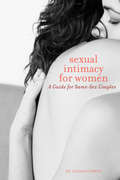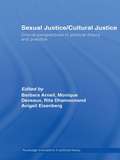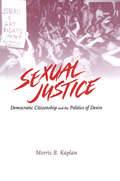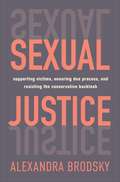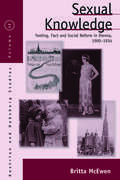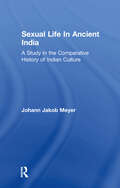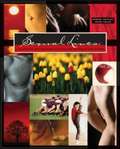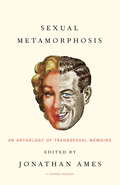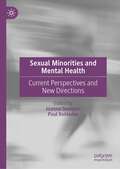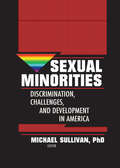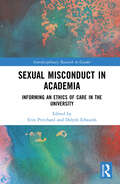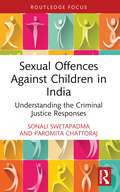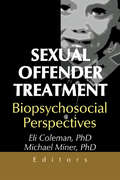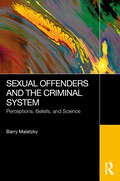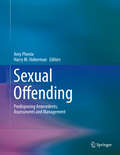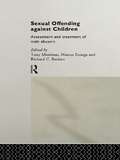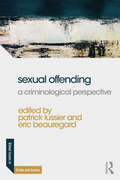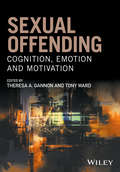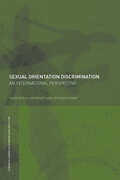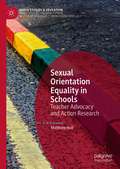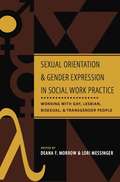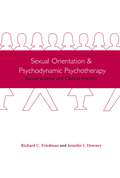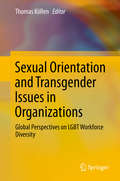- Table View
- List View
Sexual Intimacy for Women: A Guide for Same-Sex Couples
by Ph.D. Glenda CorwinSexual Intimacy for Women helps female couples examine the emotional, physical, and psychological aspects of their relationships, with the goal of creating more intimacy. Exercises and client-based anecdotes from Dr. Corwin's years of experience with same-sex couples help women overcome common issues around orgasm, body image, identity, aging, and parenthood. Dr. Corwin dispels myths, examines the intricacies of female desire, and gives advice to help couples achieve long-lasting, healthy, and fulfilling relationships.
Sexual Justice / Cultural Justice: Critical Perspectives in Political Theory and Practice (Routledge Innovations in Political Theory #Vol. 23)
by Rita Dhamoon Barbara Arneil Monique Deveaux Avigail EisenbergThis key volume explores the relationship between cultural justice and sexual justice in multicultural societies in a new light. The authors challenge the framing of ‘feminism and multiculturalism’ as one of inevitable conflict, as well as the portrayal of liberal sexual equality and cultural rights as irreconcilable, moving the debate beyond the culture/gender impasse. Focusing on three theoretical themes from a feminist perspective: the meaning and role of culture and identity in politics the problem of autonomy in relation to culture and identity the crucial role of democracy in addressing the theoretical and practical problems raised by this set of issues. The diverse contributors break new theoretical ground by providing detailed engagement with the concrete experiences of women and minorities who are caught in the dilemmas of gender and cultural justice. The collected chapters address sexual/cultural justice in a range of different countries, offering illuminating case studies on Britain, South Africa, Canada, the Netherlands, Australia, Mexico, and the United States. Sexual Justice / Cultural Justice will be of strong interest to students and researchers working in the areas of gender and feminist theory, politics, law, philosophy and sociology.
Sexual Justice: Democratic Citizenship and the Politics of Desire
by Morris B. KaplanSexual Justice defends a robust a robust conception of lesbian and gay rights, emphasizing protection against discrimination and recognition of queer relationships and families. Synthesizing materials from law, philosophy, psychoanalysis and literature, Kaplan argues that sexual desire is central to the pursuit of happiness: equal citizenship requires individual freedom to shape oneself through a variety of intimate associations.
Sexual Justice: Supporting Victims, Ensuring Due Process, and Resisting the Conservative Backlash
by Alexandra BrodskyA pathbreaking work for the next stage of the #MeToo movement, showing how we can address sexual harms with fairness to both victims and the accused, and exposing the sexism that shapes today's contentious debates about due processOver the past few years, a remarkable number of sexual harassment victims have come forward with their stories, demanding consequences for their assailants and broad societal change. Each prominent allegation, however, has also set off a wave of questions – some posed in good faith, some distinctly not – about the rights of the accused. The national conversation has grown polarized, inflamed by a public narrative that wrongly presents feminism and fair process as warring interests.Sexual Justice is an intervention, pointing the way to common ground. Drawing on core principles of civil rights law, and the personal experiences of victims and the accused, Alexandra Brodsky details how schools, workplaces, and other institutions can – indeed, must – address sexual harms in ways fair to all. She shows why these allegations cannot be left to police and prosecutors alone, and outlines the key principles of fair proceedings outside the courts. Brodsky explains how contemporary debates continue the long, sexist history of “rape exceptionalism,” in which sexual allegations are treated as uniquely suspect. And she calls on readers to resist the anti-feminist backlash that hijacks the rhetoric of due process to protect male impunity.Vivid and eye-opening, at once intellectually rigorous and profoundly empathetic, Sexual Justice clears up common misunderstandings about sexual harassment, traces the forgotten histories that underlie our current predicament, and illuminates the way to a more just world.
Sexual Knowledge
by Britta McewenVienna's unique intellectual, political, and religious traditions had a powerful impact on the transformation of sexual knowledge in the early twentieth century. Whereas turn-of-the-century sexology, as practiced in Vienna as a medical science, sought to classify and heal individuals, during the interwar years, sexual knowledge was employed by a variety of actors to heal the social body: the truncated, diseased, and impoverished population of the newly created Republic of Austria. Based on rich source material, this book charts cultural changes that are hallmarks of the modern era, such as the rise of the companionate marriage, the role of expert advice in intimate matters, and the body as a source of pleasure and anxiety. These changes are evidence of a dramatic shift in attitudes from a form of scientific inquiry largely practiced by medical specialists to a social reform movement led by and intended for a wider audience that included workers, women, and children.
Sexual Life In Ancient India V2: A Study in the Comparative History of Indian Culture
by Johann Jakob MeyerFirst Published in 2005. This is book attempts to give a true and vivid account of the life of woman in ancient India, based upon the immense masses of material imbedded in the two great Epics, the Mahabharata and the Ramayana.
Sexual Lives: A Reader on the Theories and Realities of Human Sexualities
by Betsy Crane Robert HeasleyHistorical, cultural, religious perspectives on sex; sex and the body; gendered sexuality; sex and politics; commodified sex; sexual abuse and rape
Sexual Metamorphosis: An Anthology of Transsexual Memoirs
by Jonathan AmesBut who could describe my fright when, on the next morning, I awoke and found myself feeling as if completely changed into a woman. -- Case 129, Autobiography, fromPsychopathia Sexualis, a Medico-Forensic Study by Richard Von Krafft-Ebing At the time the passage above was written, people who felt trapped in the wrong gender automatically became case-studies. Today they become the men and women they always felt they were. Transsexuals test our notions of what it is to be male or female and, more provocatively, what it means to be one self as opposed to another. "Their stories," says Jonathan Ames, "hold the appeal of an adventurer's tale. " InSexual Metamorphosis, Ames presents the personal narratives of seventeen gender pioneers. Here is Christine Jorgensen, the first celebrity transsexual, greeting thousands of well-wishers from the stage of Madison Square Garden. Here is Caroline Cossey, former model and Bond (as in James) girl, being outed in the tabloid press. Here is novelist and English professor Jennifer Finney Boylan discussing her impending transformation with her heartbroken spouse and supportive yet confused colleagues. The result is a fascinating and compulsively readable book, filled with anguish, introspection and courage.
Sexual Minorities and Mental Health: Current Perspectives and New Directions
by Poul Rohleder Joanna SemlyenThis edited book presents a comprehensive guide to the research, challenges and differing perspectives within mental health for sexual minority populations in the UK. Drawing on clinical, social, health and community psychology perspectives, it brings the urgency of this topic back to the fore, providing insight into some of ways we understand and make sense of the increased prevalence of poorer mental health in these populations. Using an intersectional approach, a broad range of experts from across academia and practice explore the specific threat and discrimination faced by sexual minorities and investigate the high prevalence of poor mental health, health risk behaviours and psychological distress in these groups. The volume also offers innovative insight as to ways in which the disparities experienced by sexual minorities may be addressed. Ideal for practitioners in mental health and sexuality, as well as psychologists, policy makers, and academics alike interested in mental health, sexuality, public health, psychotherapy, psychoanalysis, or counselling, this collection features wide array of qualitative and quantitative sources to describe the current state of the art with an interdisciplinary lens.
Sexual Minorities: Discrimination, Challenges and Development in America
by Michael K. SullivanExplore the crucial issues facing the GLBT population in their struggle for acceptance in contemporary America! Sexual Minorities: Discrimination, Challenges, and Development in America examines the stumbling blocks that prevent gays, lesbians, bisexuals, and trangenders from living wholesome, healthy lives. This book concentrates on the effects of outside influences on the homosexual psyche from adolescence to mid-life and programs and services that need to be developed to improve quality of life. While some outside influences can make positive changes-such as Internet-based outreach to educate men in chat rooms about HIV-sexual minority groups face negativity from society in the forms of homophobia and heterosexism. Sexual Minorities uses statistics, charts, graphs, and surveys to reveal a remarkable trend correlating how contemporary American society treats sexual minorities and how it affects their psychological and psychosocial health. This book also reveals how-when internalized- this hurtful discrimination can cause self-hatred and depression. Each chapter focuses on a different aspect of the GLBT population, including: the history of homophobia and intolerance toward homosexuals with its basis in cultural, religious, and sociological views an in-depth survey utilizing Erikson&’s psychosocial model to determine the lifespan development of seven "out" gay males who discuss their coming-out period, their roles in society, their legacies, and later-life issues the lack of federal legislation protecting GLBT employees in the workplace and recommendations for creating a sense of security for these employees a case study revealing the high incidence rate of heterosexism amongst social workers and the repercussions this could have among homosexual clientele surveys and statistics investigating the rate of abusive behavior in lesbian relationships three chapters involving specific issues of gay, lesbian, and bisexual adolescents, such as coming out, risk and protective factors, and being homosexual in a rural environment as opposed to a city Sexual Minorities is an important tool for everyone in today&’s society-from students and practitioners of social work, health care, human sexuality, psychology, and sociology, to legislators, lawyers, activists, and business owners. This book is also vital for every parent, relative, or friend of a man or woman labeled as a sexual minority.
Sexual Misconduct in Academia: Informing an Ethics of Care in the University (Interdisciplinary Research in Gender)
by Delyth Edwards Erin PritchardThis book is about experiences of sexual misconduct in the everyday spaces of academia and what and how we can learn from these experiences to inform an ethics of care in the university. By bringing a wide range of lived experiences of students, staff and researchers out of their current marginalised positions within academic discussions, the book offers a deeper understanding of sexual misconduct in the academy for both students and staff. Each of the chapters offers not only opportunities for conversation and reflection, but addresses and suggests what responses to academic sexual misconduct could and should involve. By presenting collective accounts of experiencing, witnessing, researching and writing about sexual misconduct in academic spaces, Sexual Misconduct in Academia examines how to develop ethical pedagogical practices, if an ethics of care is to be truly implemented or transformed. This book is suitable for students and scholars in Gender Studies, Education and Sociology.
Sexual Offences Against Children in India: Understanding the Criminal Justice Responses (Routledge Frontiers of Criminal Justice)
by Sonali Swetapadma Paromita ChattorajSexual Offences Against Children in India examines the evolution of the law pertaining to sexual violence against children, the judicial decisions since the inception of the POCSO Act till date with respect to aspects of the POCSO Act and the best practices from other developed jurisdictions for handling cases and victims of child abuse.Despite being prevalent, violence against children is often hidden or underreported, though its impact is widely acknowledged. In a country like India the vocabulary to communicate around sexuality and sexual abuse is almost non-existent. India has seen its journey from having no law on sexual abuse of children to having a “special” law in the form of the Protection of Children against Sexual Offences Act 2012 (POCSO Act). This book demystifies the problem of sexual violence against children in India pre- and post-POCSO Act. There is also a novel attempt to examine the implementation of the POCSO Act in the eastern Indian states of Odisha, Jharkhand and West Bengal, and if its objectives were being attained – in content, in implementation, and in impact.This book will be useful for police, judiciary and government officials, scholars, and researchers studying comparative aspects of dealing with sexual offence cases against children.
Sexual Offender Treatment: Biopsychosocial Perspectives
by Edmond J Coleman Michael MinerGain a better understanding of the biological, psychological, and social aspects of sex offenders, their crimes, and the treatments that can help them The treatment of sexual offenders varies from culture to culture and nation to nation. Sexual Offender Treatment: Biopsychosocial Perspectives assists sex therapists, counselors, psychiatrists, and psychologists working in sex offender treatment around the world in providing more effective services. This book looks at the behavior of sexual offenders and offers treatment approaches that will stimulate your thinking and help you improve your research and treatment methodologies. This valuable and informative book introduces and discusses the formation of the new International Association for the Treatment of Sexual Offenders, which will advance the existing knowledge about the nature of sexual offenders and sexual offenses, work to improve treatment methods and disseminate information about improved methods, and scientifically evaluate therapeutic methods advocate for the right of sex offenders to effective treatment.Sexual Offender Treatment: Biopsychosocial Perspectives presents an overview of recent research in the treatment of sexual offenders as presented at the 5th International Conference on the Treatment of Sexual Offenders in 1998 in Caracas, Venezuela. This book explores: the recently revised Standards of Care for the Treatment of Sexual Offenders self-perceived aggression in relation to brain abnormalities in a sample of incarcerated sexual offenders self-concepts and interpersonal perceptions of sexual offenders in relation to brain abnormalities brain abnormalities and violent behavior group family interventions for the treatment of adult male child molesters the experiences of adult and adolescent female sex offenders a 7 step system to treat pedophiles who are mentally retarded, mentally ill or physically handicappedSexual Offender Treatment: Biopsychosocial Perspectives provides you with valuable insights and a cross-cultural viewpoint as you benefit from the expertise and experience of international scholars who have set the standards for the treatment of sex offenders.
Sexual Offenders and the Criminal System: Perceptions, Beliefs, and Science
by Barry MaletzkyThis book demonstrates that the criminal justice system in the United States has allowed the natural emotions surrounding sexuality to allow the minority of sexual offenders who are truly dangerous to be merged with the majority of offenders who pose little, if any, risk to be at large. Such aggregations force the system to exhaust resources while ignoring the burgeoning research into the assessment and treatment of such offenders. Relying on research in the literature combined with his many years of experience, Maletzky details how the system operates at present and offers suggestions for change to re-align what we know about sexual offending with how such offenders might be better managed within the criminal justice system. The work provides an overview of the process from the original apprehension of sexual offenders through the determination of their guilt, their detention in prisons or jails, and their supervision following incarceration. Allowing scientific advances to inform decisions in these matters will not only enhance public safety but will spare unnecessary expense, save taxpayers money, and actually serve to prevent future recidivism among such offenders. This work is thought-provoking for attorneys, prosecutors, legal assistants and law clerks, members of the judiciary, those who teach or are students of the administration of justice, those who assess or treat sexual offenders, and offenders and their families affected by the system.
Sexual Offending
by Amy Phenix Harry M. HobermanThis expert reference provides a broad, comprehensive review of the major domains of sexual offending. Beginning with an integrated etiological model of sexual offending, chapters follow addressing the primary predisposing conditions related to sexual offending (e. g. pedophilic, hebephilic, paraphilic rape and non-contact paraphilic disorders, hyper sexuality and personality factors). In addition, special subgroups of sexual offenders (females, youth and the intellectually disable) are considered. Both broad and specific perspectives on the assessment of sexual offenders are provided. Overviews are offered of clinical and forensic evaluations of such offenders and the utility of structured psychological assessment. A novel conceptual model of risk assessment is proposed. More specifically, each of the primary approaches or instruments related to risk assessment of sexual offending are addressed: the Static risk assessment measures, the Sex Offender Risk Appraisal Guide, structured professional judgment, and the varied measures of dynamic or criminogenic needs assessment. Finally, multiple aspects of management of sexual offenders are discussed including models of psychosocial treatment, the question of the effectiveness of such treatment, biological interventions, civil commitment, circles of support, and the containment approach to community management. Chapters are authored by both prominent experts and experienced professionals for a breadth of perspective. Among the topics covered: Pedophilic, Hebephilic, Rape Paraphilic Disorders and the variety of Non Contact sexual offending conditions Personality, related conditions, & their association with sexual offending: motivators and disinhibition in context. Disorders of hyper sexuality. Assessments of sexual offenders, including the role of psychological testing, clinical & interview approaches, as well as forensic evaluations Conceptual models of risk assessment & discussion of specific static, dynamic & structured clinical risk assessment approaches Models of & reviews of treatment outcome with sexual offenders, including psychotherapy, psychopharmacology and castration, the containment approach, civil commitment & circles of support Overview of public policy issues & an evidence-based perspective on sex offender registration and residential restrictions. This breadth of material in Sexual Offenders will help practitioners gain multiple levels of clinical insight as well as giving them up-to-date practical tools and techniques for working with this problematic class of individuals.
Sexual Offending Against Children: Assessment and Treatment of Male Abusers
by Marcus Erooga Tony Morrison Richard BeckettWritten by a multi-disciplinary group of leading practitioners, Sexual Offending Against Children provides an account of the practice, policy and management issues involved in the assessment and treatment of adult and adolescent sexual offenders against children. Written for practitioners from all disciplines concerned with this area of work, it is underpinned by a strong theoretical base, giving a practical and detailed description of the management of sexual offenders, as well as the potential impact on service providers.
Sexual Offending by Strangers
by Paul V. GreenallExploring a specific type of sexual violence committed by a specific type of sexual offender, namely adult male on adult female stranger sexual violence, this book provides readers with an enhanced understanding of both the offences being committed and the offenders who commit them. Although acts of serious stranger sexual violence are rare, they are important as they occur in the context of there being no pre-existing relationship between the offender and victim, meaning they present significant challenges to criminal justice practitioners who are required to investigate, assess and understand such offending. Arguing for the importance of adopting an ideographic perspective, this book encourages readers to draw upon a variety of different theories and models as appropriate, such as considering the impact of a behavioural conditioning process, where sexual violence is a manifestation of prior learning or early life experiences. Divided into four sections, this comprehensive volume guides the reader through key concepts, different types of stranger sexual violence, and applications to criminal justice practice.Sexual Offending by Strangers will be of use to police officers, prison officers, and practitioners working with offenders in either secure or community settings. It will also be of value to students and scholars researching the topic of sexual violence.
Sexual Offending: A Criminological Perspective (Global Issues in Crime and Justice)
by Patrick Lussier Eric BeauregardThere is growing recognition that sexual offending is a multi-determined phenomenon requiring a multi-disciplinary perspective. The significant contribution of psychology and psychiatry, but also sociology, gender studies and anthropology to the study of sex offending and perpetrators of sex offenses has played a key role in the development of a distinct field of research. In recent years, however, there has been an increase in criminological research on the topic, introducing criminological theory and concepts, scientific evidence and observations, and new methodologies to the field.This book brings together international leading scholars to consider key topics on sex offending and, where possible, compare and contrast criminological viewpoints with those of other disciplines, such as psychology and psychiatry. This book considers the following questions: Are the key explanatory factors of sex offenses completely distinct and different from those of non-sex crime and delinquency? Are current models explaining adult sex offending also applicable to explain sex crimes on college campuses, female sex offending, sexual exploitation, sexual homicide, or child luring over the internet? Are today’s youth involved in sex offenses tomorrow’s adult perpetrators of sex crimes? What is the risk of sexual recidivism and are risk assessment tools effective to identify individuals at-risk of committing another sex crime in the future? Are current legal measures used to prevent sex crimes effective? What are the known effects of such measures? What are the issues and challenges related to the criminal investigation of sex offenses? This book is essential reading for students and researchers from disciplines such as criminology, psychiatry, psychology, sexology, social work and sociology, as well as criminal justice professionals and practitioners such as police investigators, prosecutors, judges, probation/parole officers, and treatment providers/counsellors involved with individuals having perpetrated sex offenses.
Sexual Offending: Cognition, Emotion and Motivation
by Tony Ward Theresa A. GannonSexual Offending presents the latest theory and research relating to the social cognition, emotion, and motivational goals of individuals who have committed sexual offences. Explores how individuals who have committed sexual offences perceive the world and themselves, and how understanding this can inform their rehabilitation Provides a broad-based view of cognition, and explores the complex relationship between cognition, emotion and associated constructs such as motivational goals Integrates recent work on female sexual offenders alongside the literature on their male counterparts, providing researchers and practitioners with a single resource A valuable handbook for researchers, practitioners and students concerned with understanding and rehabilitating individuals who have committed sexual offences
Sexual Orientation Discrimination: An International Perspective (Routledge IAFFE Advances in Feminist Economics)
by Lee Badgett Jeff FrankHaving recently authored one of the most significant books, Money, Myths and Change, in this exciting area of economics, Lee Badgett has now teamed up with Jeff Frank and a collection of international contributors to provide an analysis of sexual orientation discrimination on an international scale. Discrimination based on sexual orientation continues to fuel collective action, policy debates and academic scrutiny in many countries. For some time, sociologists and psychologists have studied sexual orientation discrimination in institutions and explored prejudices against lesbian, gay, bisexual, and transgender people in mainstream areas. Now economists have also begun to examine the experiences of lesbians, gay men and bisexuals in less traditional research sectors including the labour, housing, credit, and retail markets. This book includes sections on: wages and jobs discrimination across institutional contexts discrimination in cultural institutions including religion, education and sport addressing discrimination through public policies. Innovative and up-to-date this book is an essential read for postgraduate students studying in the areas of political economy, gender studies and feminist economics.
Sexual Orientation Equality in Schools: Teacher Advocacy and Action Research (Queer Studies and Education)
by Matthew HoltThis book explores how to help teachers become better advocates for sexual orientation equality in secondary schools. Examining this issue through the lens of qualitative emancipatory action research, a group of Australian teachers embarked on a journey of teacher advocacy. Critical theory has long highlighted teachers as key players in either challenging dominant social narratives, or else perpetuating oppressive systems of power through traditional forms of education. Despite this important role, the life stories of teachers, which contributed to the development of their beliefs and behaviours about sexual orientation are rarely considered in the development of anti-discriminatory policy, designing the curriculum and most importantly, in teacher training. This book suggests and frames a model for advocacy, whereby teachers engage with their personal beliefs about sexual orientation, with their role as a teacher, and commit to advocacy through action by promoting student safety, challenging heteronormative narratives and role modelling compassionate behaviours in their school environments.
Sexual Orientation and Gender Expression in Social Work Practice: Working with Gay, Lesbian, Bisexual, and Transgender People
by Lori Messinger Deana MorrowThis volume offers an invaluable resource for both social work educators and practitioners working with gay, lesbian, bisexual, and transgender (GLBT) clients and their families. It is the first such work to specifically address issues affecting bisexual and transgender people as well as the larger concerns of the GLBT community.Contributors present specific, practical suggestions for effective knowledge-based and skills-based practice with GLBT clients. Topics include heterosexism and homophobia, identity development, coming out, GLBT adolescents and older adults, health-care concerns, relationships and families, workplace issues, the history of the GLBT civil rights movement, sex reassignment, AIDS, and the role of spirituality in the lives of GLBT individuals. The contributors also consider intragroup issues of race, ethnicity, age, and socioeconomic status.
Sexual Orientation and Psychodynamic Psychotherapy: Sexual Science and Clinical Practice
by Richard Friedman Jennifer DowneyThis book bridges psychoanalytic thought and sexual science. It brings sexuality back to the center of psychoanalysis and shows how important it is for students of human sexuality to understand motives that are often irrational and unconscious. The authors present a new perspective about male and female development, emphasizing the ways in which sexual orientation and homophobia appear early in life. The clinical section of the book focuses on the psychodynamics and treatment of homophobia and internalized homophobia.
Sexual Orientation and Psychodynamic Psychotherapy: Sexual Science and Clinical Practice
by Richard Friedman Jennifer DowneyThis book bridges psychoanalytic thought and sexual science. It brings sexuality back to the center of psychoanalysis and shows how important it is for students of human sexuality to understand motives that are often irrational and unconscious. The authors present a new perspective about male and female development, emphasizing the ways in which sexual orientation and homophobia appear early in life. The clinical section of the book focuses on the psychodynamics and treatment of homophobia and internalized homophobia.
Sexual Orientation and Transgender Issues in Organizations
by Thomas KöllenOver the last decade workforce diversity has attracted much scientific attention. Given the shortage of literature on issues related to homosexual, bisexual and transgender employees, compared to other facets of workforce diversity, this book opens up new perspectives on this issue. Emphasis is placed on the equal consideration of gay, lesbian, bisexual, and transgender issues. Thus the predominance of lesbian and gay issues in LGBT research (and practice), will be contrasted by an explicit consideration of the unique experiences, stressors and related needs of bisexual and transgender employees. Contributions provide deeper insights into the differing experiences the whole spectrum of LGBT employees make in the workplace in different national and occupational contexts. Furthermore, the collection offers contextualized insights for evaluating and conceptualizing organizational initiatives aiming at a higher level of inclusion for LGBT employees.
